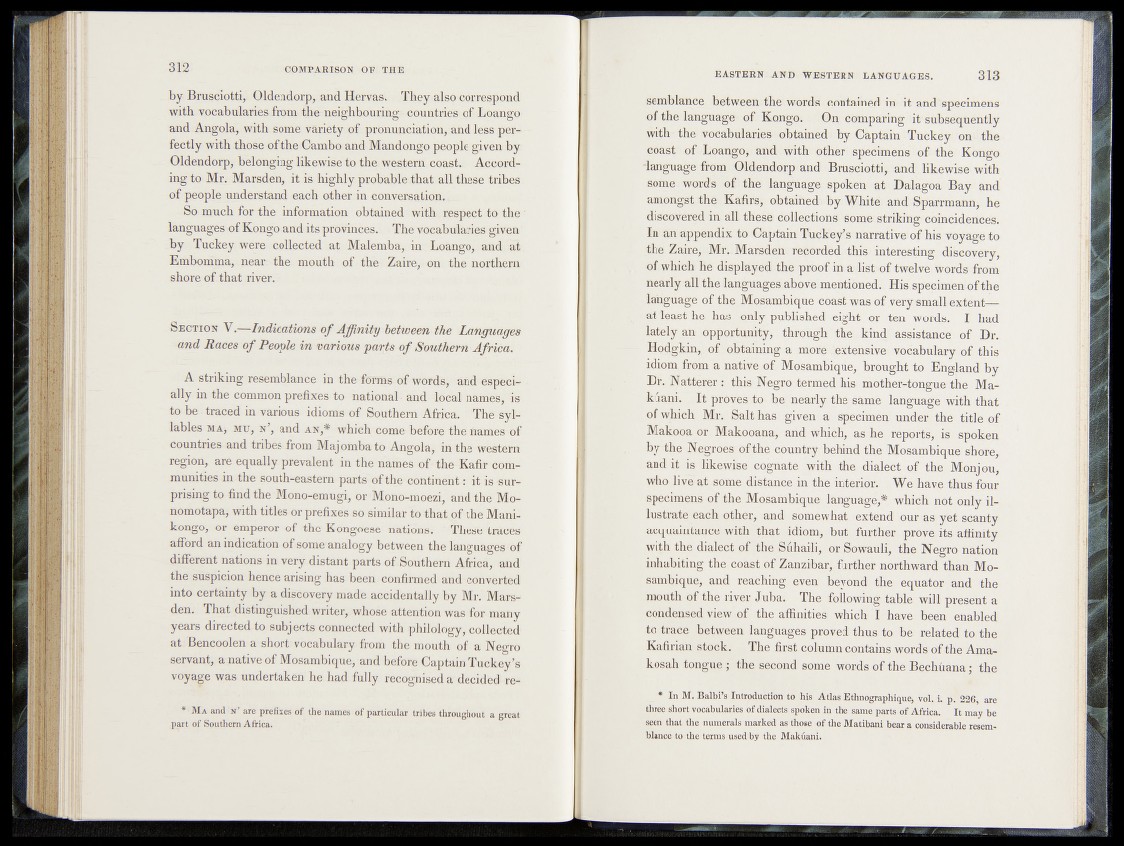
by Brusciotti, Oldendorp, and Hervas. They also correspond
with vocabularies from t,ho neighbouring countries of Loango
and Angola, with some variety of pronunciation, and less perfectly
with those of the Cambo and Mandongo people given by
Oldendorp, belonging likewise to the western coast; According
to Mr. Marsden, it is highly probable .that all these tribes
of people understand each other in conversation..
So much for the information obtained with, respect to the
languages of Kongo and its provinces.| The vocabularies given
by Tuckey were collected at Malemba, in Loango, and at
Embomma, near the mouth of the Zaire, on the northern
shore of that river.
S ection Y.—Indications of Affinity between the Languages
and Races of People in various parfs of Southern Africa.
A striking resemblance in the forms of words, and e&pifel-r
ally in the common prefixes to national- and local nai&es^ls
to be traced in various idioms of Southern Africa. The syllables
ma, mu, n’, and an,* which come before the flame's;of
countries and tribes from Mnjombato Angola, in the western
region, are equally prevalent in the names of the-Kafir cdtti-~
munities in the south-eastern parts'of the continents it is -surprising
to find the Mono-emugi, or Mono-moezi, and the Mo-
nomotapa, with titles or prefixes so similar to that of the Mani-
kongo, or emperor of the Kongoese nations. The^e traces
afford an indication of some analogy between the languages of
different nations in very distant parts of Southern Africa, and
the suspicion hence arising has been. confirmed and^converted
into certainty by a discovery made accidentally by Mr. Marsden.
That distinguished writer, whose attention was for many
years directed to subjects connected with philology, collected
at: Bencoolen a short vocabulary from the mouth of a Negro
servant, a native of Mosambique, and before Captain Tuckey’s
voyage was undertaken he had fully recognised a decided re*
- M a and n’ are prefixes of the names of particular tribes throughout a great
part of Southern Africa.
semblance between the! words contained in it and specimens
of the language- of Kongo. On comparing it subsequently
with the- vocabularies obtained by Captain Tuckey on the
©oast of .Loangop and with; other specimens of the Kongo
-language from Oldendorp and* Brusciotti, and likewise with
spine words of the language spoken at Dalagoa Bay and’
amongst the> Kafirs, obtained^ by White and Sparrmann, he
discovered in all. these collections some'striking-coincidences.
In an appendix to Captain Tuckey’s narrative of his voyage to
the Zaire, Mr. Marsden recorded this -interesting discovery,
of, which he displayedlthe proof in Ayfist?of twelve» words from
nearly all the languages.above-mentioned. His-specimen of the
language of the Mosambique coast was of very-small extent—
at least he has only published eight or ten words. I had
lately an opportunity, through the kind assistance of;/ Dr.
Hodgkin, of obtaining a more -extensive vocabulary of. this
idiom, from a native of Mosambique, brought to England by
Dr. Natterer : this Negro termed his mother-tongue the Ma-
kuUni. ' It proves to be nearly the same language with that
of which Mr. Salt has given a specimen under the title of
Makooa or Makooana, and which, as he reports, is spoken
by the Negroes of the country behind the Mosambique shore,
and it is likewise cognate with the dialect of the Monjou,
who. live at some distance in the interior. We have thus four
specimens of the Mosambique language,* which not only illustrate
each other, and somewhat extend our as yet scanty
acquaintance with that idiom, but further prove its affinity
with the dialect of the Suhaili, or Sowauli, the Negro nation
inhabiting the coast of Zanzibar, further northward than Mosambique,
and reaching even beyond the equator and the
mouth of the liver Juba. The following table will present a
condensed view of the affinities which I have been enabled
to trace between languages proved thus to be related to the
Kafiriah stock. The first column contains words of the Ama-
kosah tongue; the second some words of the Bechuana; the
* In M. Balbi’s Introduction to his Atlas Ethnographique, vol. i. p. 226, are
three short vocabularies of dialects spoken in the same parts of Africa. It may be
seen that the numerals marked as those of the Matibani bear a considerable resemblance
to the terms used by the Makfiani.